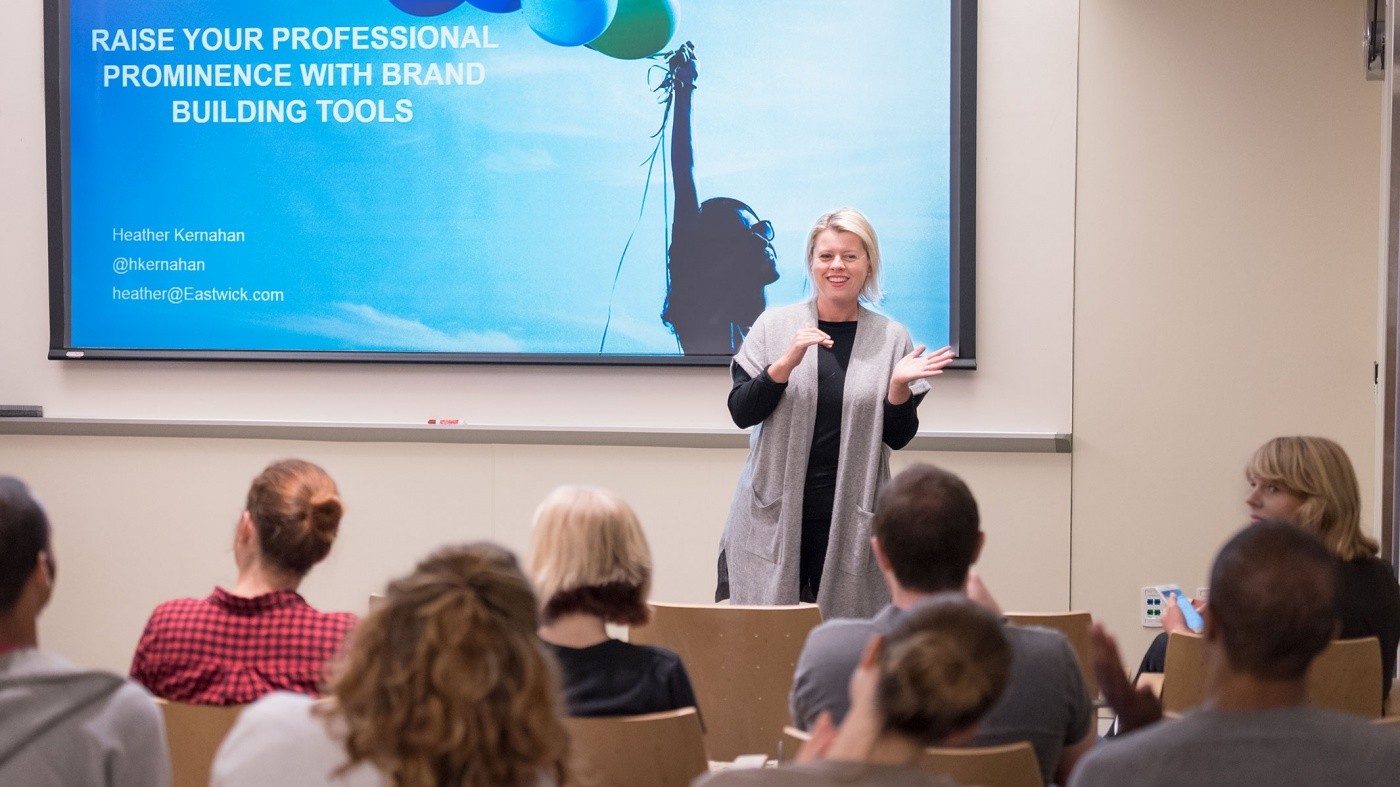Gladstone NOW: The Campaign Join Us on the Journey✕

Heather Kernahan, president of Eastwick, spoke to Gladstone's postdocs about how to build their professional brand.
Postdoctoral fellows are a vital part of scientific research at the Gladstone Institutes. They are the engine that drives new discoveries and advances research towards cures for diseases.
To celebrate and support this exceptional community, Gladstone offers a series of events and resources to help postdocs thrive at Gladstone and beyond.
National Postdoc Appreciation Week
Every year in September, Gladstone joins other universities and research organizations across the United States to celebrate National Postdoc Appreciation Week (NPAW). The National Postdoctoral Association (NPA) established NPAW in 2009 to recognize the significant contributions that postdocs make to research and discovery. To celebrate, institutions hold special events to honor and support their postdocs.
This week, Gladstone hosted a series of lectures and workshops on transitioning smoothly to a career outside of academia, maintaining work/life balance when working in the sciences, and building a professional brand. It also held networking events with Gladstone leadership and investigators, Gladstone postdocs, and the entire Gladstone community.
“We had very informative activities lined up for this year’s NPAW, covering multiple aspects of their training, such as career development, professional development, work life balance and networking,” said Sudha Krishnamurthy, PhD, who organized the events for the week.
Gladstone’s support of postdocs goes beyond a single week, though. The Office of Postdoctoral and Graduate Affairs (OPGA) works to ensure that Gladstone postdocs receive the best scientific training and career mentoring year-round.
Office of Postdoctoral and Graduate Affairs
OPGA oversees all activities regarding Gladstone’s postdocs, including helping them with career and professional development, mentoring, employee relations, and conflict resolution issues.
“Gladstone has over 100 postdocs training in different disease areas, and they each have unique knowledge, experiences, and career aspirations,” said Krishnamurthy, program director of the OPGA. “The OPGA works directly with the postdoc community to give them personalized attention, catering to their individual needs and enhancing their training experience at Gladstone.”
Since its inception, the OPGA has made great strides in improving Gladstone’s postdoc training program, including establishing a committee of postdocs to advocate for their personal and professional development at Gladstone.
Gladstone Postdoctoral Advisory Committee
The Gladstone Postdoctoral Advisory Committee (GPAC) was established in 2008 to help create a training environment that supports the professional and scientific development of postdoctoral fellows at Gladstone. GPAC is led by two co-chairs, who coordinate and oversee the progress of four sub-committees: communications, mentoring, work life balance, and training and career development including grant support. GPAC also forms various taskforces as needed for special projects, such as the postdoc website and professional development activities.
“GPAC is a strong group of focused and dedicated postdocs at Gladstone,” explained Krystal Fontaine, PhD, the newest co-chair of GPAC. “They have been instrumental in shaping the postdoc training program at Gladstone.”
With the aid of leadership and postdocs across Gladstone, GPAC has accomplished many missions, including establishing mentoring and childcare assistance programs, holding career development panels and workshops, adopting individual development plans, and founding the Exploring Careers in Industry and Technology (ExCITe) program and career exploration series which enable our trainees to learn and explore various PhD career options in peer teams.
ExCITe Program
Postdocs often face a difficult decision in choosing their ideal career path. ExCITe introduces Gladstone postdocs and graduate students to a variety of industry careers through site visits to companies and workshops. These visits inform postdocs of careers outside of academia and give them the opportunity to engage and network with company employees. They also provide companies with a pool of highly qualified potential future employees.
“Through the ExCITe program, our trainees have been exposed to so many different organizations and careers,” said Krishnamurthy, who oversees the ExCITe program. “Many of our postdocs have discovered career paths and made new professional connections through these visits”
Keys to Success
To attract the best people, Gladstone strives to be one of the best places for postdocs to work—an honor it has received eight times from The Scientist Magazine. To continue this legacy, Gladstone is constantly working to improve its resources.
“Our postdocs make essential contributions to Gladstone science and to our community,” shared Gladstone President R. Sanders “Sandy” Williams, MD. “Their creativity, hard work, and dedication are key drivers of success in our mission of Science Overcoming Disease.”

